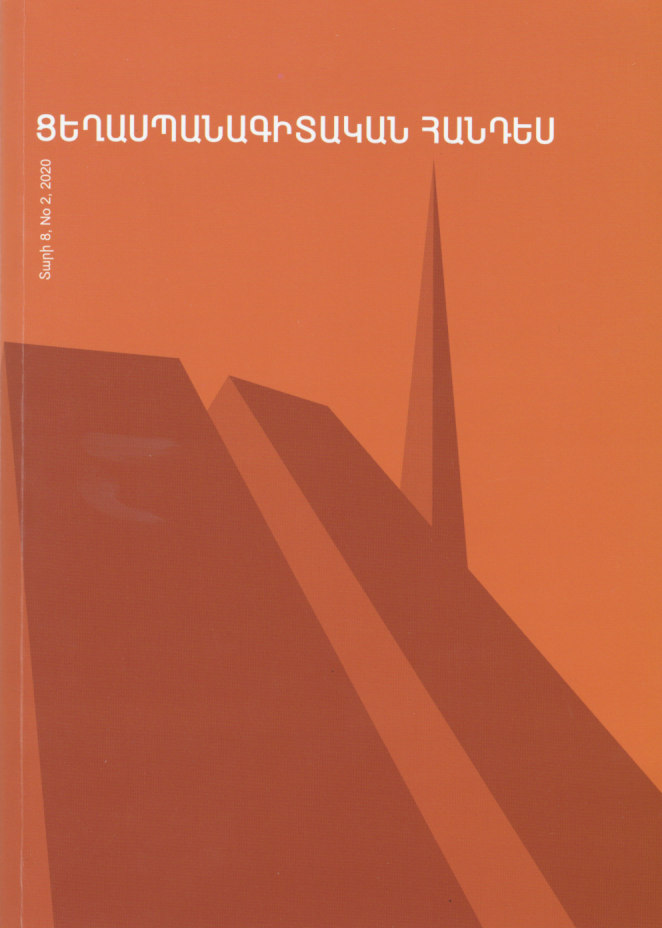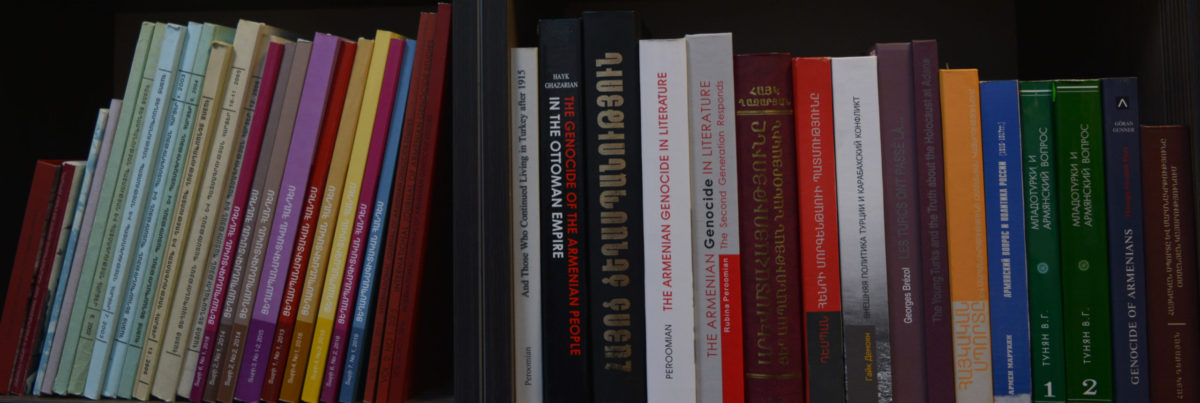
Ts՚eghaspanagitakan handes (“Journal of Genocide Studies”)
Shushan R. KhachatryanPhD in History, theologian, head of the Armenian Genocide Victims’ Documentation and Data Collection Department, Armenian Genocide Museum-Institute Foundation.
Research fields – Theological and Religious Studies of genocides, religious clashes during the genocides, philosophy of Holocaust, theodicy, persecutions of Christians in XX-XXI centuries, etc.
E-mail: khachatryan.shushan@genocide-museum.am
Pages 9-41
Summary
The article presents and analyses the Turkish intellectual Halidé Edip and her role in the state policy of Turkifi cation of Armenian children at the Antoura orphanage during the Armenian Genocide. The article compares the three known memoirs of Armenian orphans from Antoura (Garnik Banyan, Harutyun Alboyajyan, and Melqon Petrosyan) to that of Halidé Edip, and reveals essential differences, manipulations, as well as disguised facts by Edip that are collected and presented in the article. Thus, the research identifies the problem field relating to various aspects of Antoura orphanage by raising new questions, offering explanations and new approaches, as well as highlighting issues that need to be researched further.
Keywords: Armenian Genocide, Antoura orphanage, Halidé Edip, Armenian orphans, Turkification policy, military, “new janissaries,” eugenics.
Received on 12.09.2020
Accepted on 01.10.2020
Narine V. MargaryanPhD in History, orientalist, academic-secretary, Armenian Genocide Museum- Institute Foundation.
Research fields – the plight of Armenian refugees in the Arabic countries of the Middle East during and after the Armenian Genocide, the process of their social–economic and political integration as well as their relations with local Arab population.
E-mail: narine.margaryan@genocide-museum.am
Pages 42-75
Summary
The three-year issues of Tun [Home] pupils’ magazine of the Near East Relief’s Jbeil (Lebanon) orphanage have been researched and analyzed in this paper. The article has studied the papers written by orphans sometimes based on emotions, patriotism, and sometimes on realistic approaches. By analyzing and summarizing the papers this article aims at better understanding the nationalistic atmosphere in the orphanage, the feelings of the children and the steps undertaken to overcome the consequences and hardships of the Genocide.
Summarizing the content of the papers published in 34 issues of the journal, the article concludes that Tun with its articles on literature and national feelings, pieces of evidence about homeland and the years of Genocide had a special meaning for the orphans. Through the articles the orphans of Jbeil made unique attempt of national reconstruction, which contributed to their efforts to overcome the trauma of Genocide. Among the papers were articles about the events of April 24 and dedicated to the memory of martyrs, articles on the Armenian language, literature and folklore, and the Armenian spiritual values sharing them with the younger generation through reading and reciting.
Keywords: Armenian Genocide, Lebanon, orphans, national conscience, the orphanage of Jbeil, pupils’ magazine, orphanage press, education, national reconstruction.
Received on 12.10.2020
Accepted on 30.10.2020
Anna A. VardanyanPhD in Economics, economist, japanologist, senior lecturer at the Departments of “Finance” and “International Economic Relations” at Armenian State University of Economics, Founding President of “Arumenia-Nippon” Scientific Cultural Union.
Research fields – Armenian-Japanese cultural, historical and diplomatic relations, international economic relations, finances, etc.
E-mail: info@v-ann.am, Tehmine R. MartoyanPhD in History, specialist in international relations/oriental studies (Iranology), specialist in genocide studies, senior researcher at the Department of Organizing Museum Exhibitions, Armenian Genocide Museum-Institute Foundation.
Research fields – the history of the annihilation of the Armenians and Greeks of Smyrna and the fire of the city, psychological denial of victim, etc.
E-mail: tehminemartoyan@gmail.com
Pages 76-95
Summary
The purpose of the research is to comprehensively present the rescue process of the Armenians and Greeks exiled from Smyrna, tracking the example of a Japanese ship. To achieve the stated goal, the history of the Smyrna fire and the extermination of the Armenian and Greek populations of the local Christian districts have been studied, the details of the Japanese ship’s arrival and the passage of the survivors to the Greek shores has been explored according to the verificated data by eyewitness-survivors.
The relevance of the research topic is conditioned by the “originality” and importance of the rescue operation performed by the Japanese ship. Voicing out about such realities nowadays will contribute educating a righteous and unbiased society.
Keywords: Armenian Genocide, Greek Genocide, exile, Japanese ship, captain, rescue, humanitarianism, Smyrna, Greece.
Received on 09.10.2020
Accepted on 30.10.2020
Narine S. HakobyanInternational relations specialist, PhD student at the Armenian Genocide Museum-Institute Foundation, junior researcher at the Department of the Armenian Genocide Memoirs, Documents and Press, Armenian Genocide Museum-Institute Foundation.
Research field – Armenian massacres of 1894-1896.
E-mail: hakobyan.narine@genocide-museum.am
Pages 96-120
Summary
This historiographical essay explores how the scholarship on the Hamidian massacres has evolved in Western English-language scholarship over the past fifty years introducing the main debates on this topic. The discussion reveals that almost all scholars have reflected on the question of “continuity” between the Hamidian massacres and the Armenian Genocide. Arguing for or against the “continuity” they have made it perhaps the most discussed issue in the scholarship. This paper rejects this dichotomy and argues for a more complex view on Hamidian massacres that should consider both perspectives and not necessarily contrast them. Morover, it contends that positioning the Hamidian massacres in relation to the Armenian Genocide is not enough for its contextulization. The paper argues that the contextualization of the Hamidian massacres should (a) place it and the Armenian Genocide in the context of the Armenian Question, (b) consider the Ottoman massacres of other subject groups in a longer (1820s-1920s) perspective, and (c) observe the Hamidian massacres transcending the “container” of the Ottoman state and discussing the foreign factors in the Ottoman violence.
Keywords: Armenian Genocide, Hamidian massacres, historiography, Armenian Question, Ottoman Empire.
Received on 17.09.2020
Accepted on 11.10.2020
Aram R. MirzoyanPhD in History, researcher at Armenian Genocide Victims’ Documentation and Data Collection Department, Armenian Genocide Museum-Institute Foundation.
Research field – reflections on the role of German Empire and Germans in the Armenian Genocide in Armenian historiography and survivor memoirs.
E-mail: mirzoyan.aram@gmail.com
Pages 121-138
Summary
In studying the history of the Armenian Genocide, consideration of the issue of the organizers of this crime and accomplices is of key importance. In the context of the second part of this question, the problem of complicity of the German Empire is of greatest interest.
Armenian and foreign researchers have regularly addressed this problem (including coverage of a broader topic – the role of the German Empire during the Armenian Genocide in previous years), studying it from different points of view: political, military, economic, humanitarian, etc. The already accumulated research material has created the need for some intermediate observations.
The article presents some intermediate conclusions and prospective areas of research on this topic. They can be useful for researchers planning to deal with the topic of the involvement of the German Empire in the Armenian Genocide, in order to avoid possible repetitions and facilitate their research path.
Keywords: Armenian Genocide, German Empire, complicity, memoirs and testimonies, German military.
Received on 10.11.2020
Accepted on 29.12.2020

All works in the "Journal of Genocide Studies" are licensed under a Creative Commons Attribution-NonCommercial 4.0 International License.
